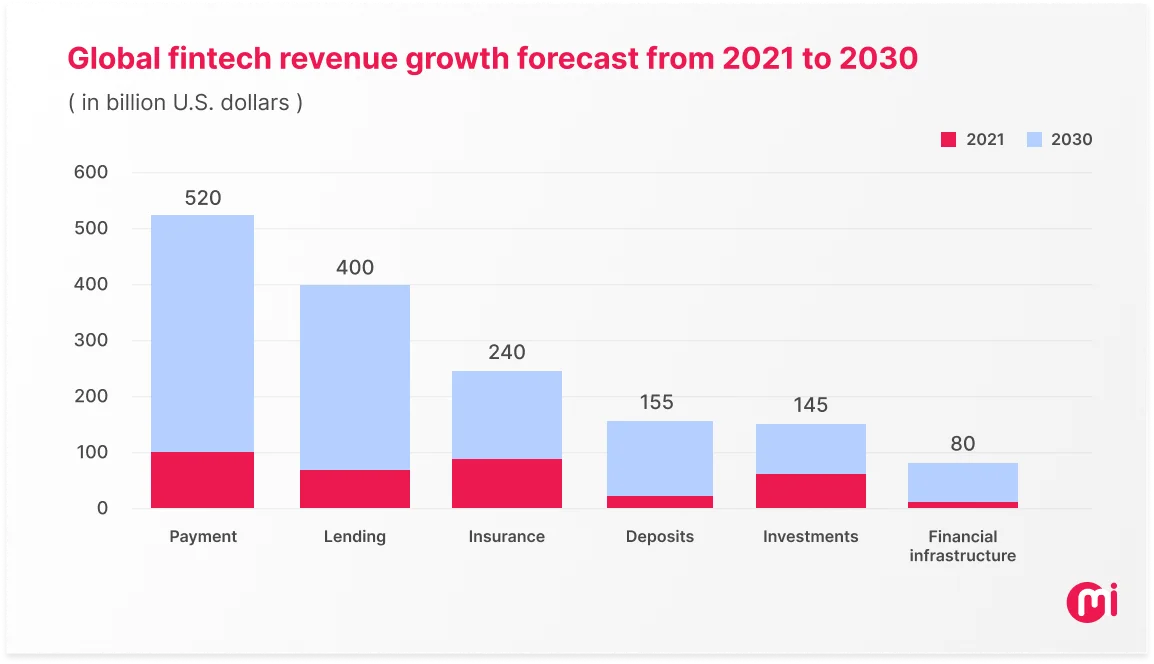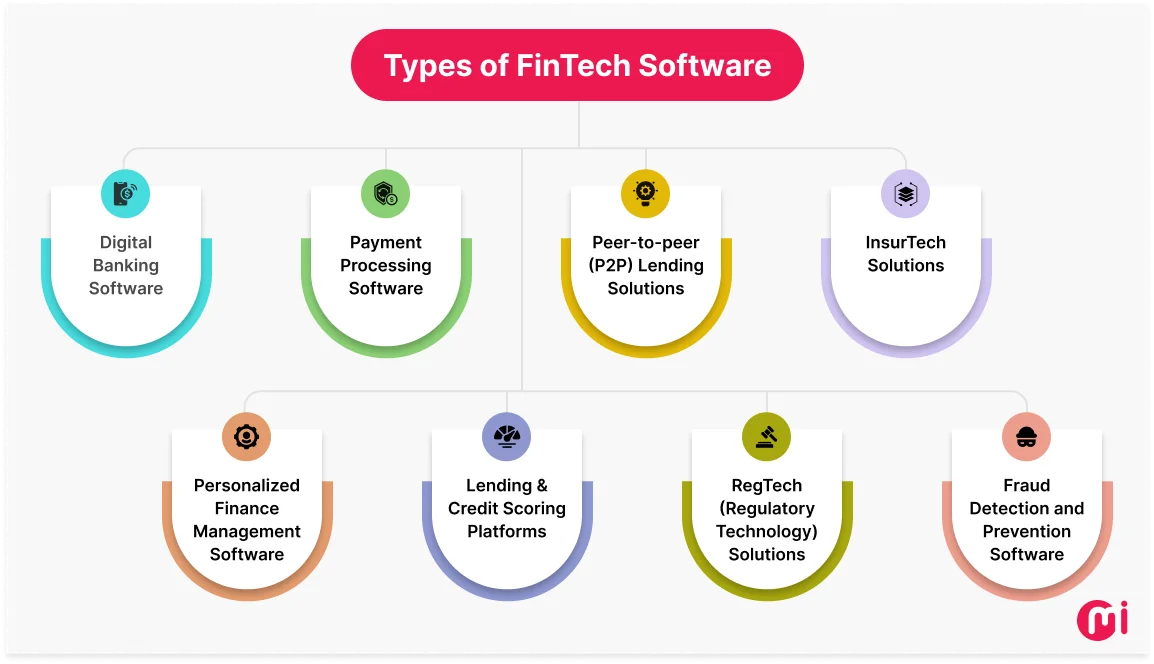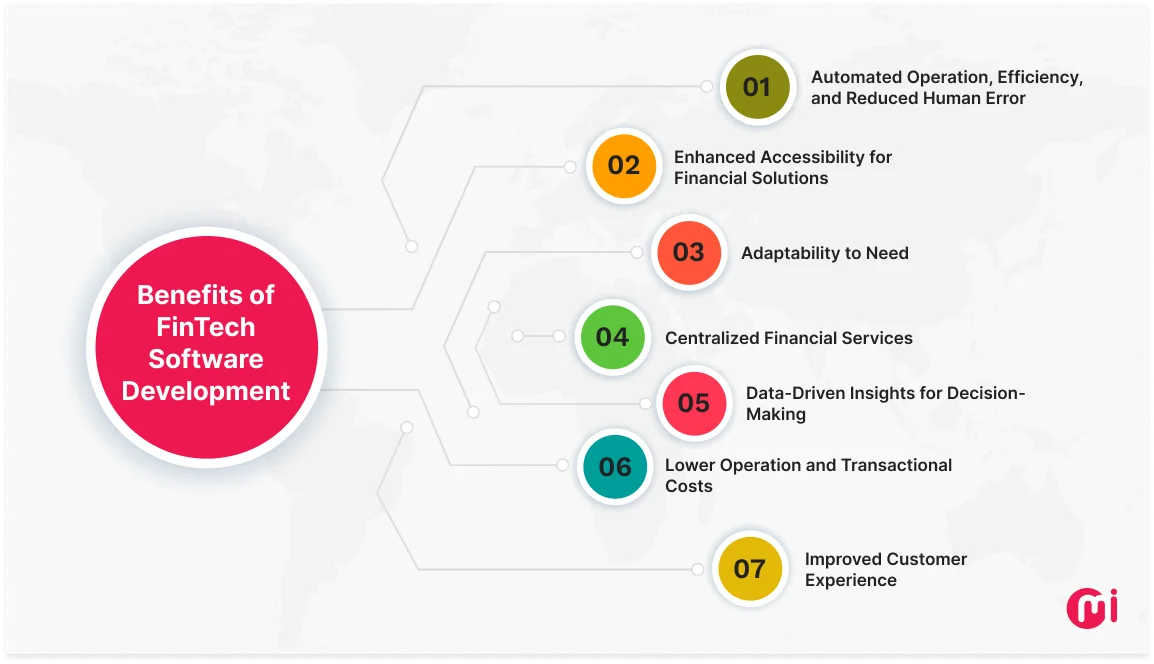Table of Contents
Among many others, technology revolutionizes the fintech industry, too. Be it wealth management solutions, audit and compliance management solutions, RPA solutions for financial services, or anything else, FinTech software development transforms how financial institutions operate in this digital era. Curious to know how it does so? Fret not! Read this guide to know everything about FinTech software development along with its types, features, real-life use cases, and benefits.
Do you know that the fintech market size was $294.74 billion in 2023 and is anticipated to be $1,152.06 billion by 2032? The growth will be a CAGR of 16.5% during the forecast period (2024-2032). This exponential growth is attributed to the conveniences FinTech software brings to financial institutions and their customers.
PayPal, Stripe, Revolut, and Monzo are among the top-tier fintech software that simplify financial operations. From online payment processing to seamless transactions, currency exchange, cryptocurrency trading, account management, bill payments, and more, they streamline financial operations and elevate user experience.


Be it banks, credit unions, investors, or traders, FinTech software allows them to streamline financial processes, reduce costs, enhance security, and improve customer experiences. However, these are a few, this blog will let you know everything about FinTech software development services.
Be it building a fintech software from scratch or just you need to upgrade an existing one, this blog will give you the clarity to move forward seamlessly, ensuring your project and business success.
What Is FinTech Software Development?
FinTech is the portmanteau of finance and technology that refers to the use of digital applications and software to transform traditional financial services such as banking, payments, and investments.
FinTech software development is the process of developing software or digital applications that leverage technology to transform traditional financial services. It automates tasks and offers a user-friendly experience through platforms such as mobile banking, digital wallets, and cryptocurrency trading. Besides, FinTech software solutions prioritize security and compliance with financial regulations, offering safe assistance to financial proceedings.
Sidepocket is one such example of FinTech software solution. It’s a tactical asset allocation robo-advising app that allows institutions to redefine the way people engage with their finances. The very solution is designed specifically to lessen the drawdown and risk while enhancing diversification and potential profits.
FinTech Software Market Statistics
- The fintech industry’s revenue is anticipated to grow, following diverse trends across segments between 2021 and 2030. While the lending segment is projected to lead with a revenue of $400 billion, the payments segment is expected to lead with a revenue of $520 billion in 2030, showcasing the ongoing shift toward digital transactions.
- With a revenue of $240 billion, the insurance segment secures the 4th position, while the deposits and investments have $155 billion and $145 billion, respectively.


Types of FinTech Software
FinTech solutions are designed to automate and streamline financial activity and provide solutions to business problems. There is a wide variety of FinTech solutions designed specifically to cater to the different aspects of financial institutions. These involve payment, lending, wealth management, and many more. Following are the top-notch types of the most popular FinTech software solutions you may like to be aware of:


1. Digital Banking Software
Digital banking software comes embellished with all the features of a traditional bank, including account opening and management, loan management, payment processing, etc. Accessible through mobile apps or web platforms, these solutions offer every needed solution, empowering financial institutions and their customers with streamlined banking experiences.
Examples: Chime, Revolut, N26, and Monzo are among the top-tier digital banking software solutions, easing the banking experience of users.
2. Payment Processing Software
Payment processing software allows businesses and customers to conduct financial transactions to make and accept payments digitally. These include bank transfers, debit/credit card payments, digital wallets, and mobile payments by connecting businesses, customers, and banks. These software solutions encrypt data, ensure security compliance, and often involve features such as fraud detection and reporting for seamless transactions.
Examples: Stripe, Adyen, and PayPal are among the most popular payment processing software.
3. Peer-to-peer (P2P) Lending Solutions
P2P lending solutions tend to match lenders with borrowers, bypassing traditional financial institutions. They assist borrowers in getting access to funds while allowing lenders to grab potential returns on investment, elevating the experience of investors and lenders alike. Upstart, and LendingClub are a few names using P2P lending solutions.
Examples: Prosper, LendingClub, and Funding Circle are a few examples of P2P lending software solutions.
4. InsurTech Solutions
InsurTech solutions streamline processes like underwriting, risk assessment, and claims management through AI, big data, and RPA robotic process automation. These software solutions increase efficiency, allow tailored and data-driven insurance, reduce expenses, and enhance overall customer experience.
Examples: Ethos Life, and Corvus Insurance are a few of the top InsurTech solutions.
5. Personalized Finance Management Software
Personalized finance management software enables users to intensively track, plan, and optimize finances with ease. It provides customized budgeting, investment management, expense tracking, and savings goals aligned with an individual’s spending habits and financial objectives. It assesses data and provides insights, recommendations, and alerts, empowering users to make smarter financial decisions.
Examples: Mint, Quicken, PocketGuard, and Goodbudget are a few examples of personalized finance management software solutions.
6. Lending & Credit Scoring Platforms
Lending & credit scoring platforms allow lenders to gauge and evaluate the creditworthiness of borrowers by assessing data points. They often use alternative data such as transaction history and social media activity for seamless and obstacle-free financial experiences.
Examples: Upstart, and Zest AI are among the top-notch examples of lending and credit scoring software solutions.
7. RegTech (Regulatory Technology) Solutions
RegTech (Regulatory Technology) solutions automate tasks such as auditing, reporting, risk assessment, and fraud detection. These solutions assist financial institutions to completely comply with regulatory requirements, ensuring a secure and seamless banking experience.
Examples: ComplyAdvantage, Trulioo, and Onfido are a few examples of the RegTech solutions used in FinTech.
8. Fraud Detection and Prevention Software
Making use of AI (artificial intelligence) and ML (machine learning), these solutions conduct fraud detection and fraud prevention in financial transactions. They ensure a safe and secure banking experience for customers and businesses alike.
Examples: Riskified, Kount, and Forter are among the most popular fraud detection and prevention software solutions in FinTech. Riskified provides AI-powered chargeback prevention and eCommerce fraud protection, while Kount employs machine learning for trust identification, fraud detection, and risk management. Forter offers real-time fraud detection and prevention backed by behavioral analytics and automated decision-making.
Must-Have Features of Financial Software
Designed specifically to address the needs of financial institutions and customers alike, FinTech software solutions feature intuitive UI/UX, automation through AI/ML, seamless payment processing, and so on. Here’s how they ensure efficiency, security, and a user-friendly experience for end-users.
Automation Through AI/ML Capabilities
FinTech solutions ensure automation powered by AI/ML competencies to help improve decision-making, efficiency, and tailored solutions in financial services. These features involve AI-based credit scoring, chatbots for customer service, automated financial planning through algorithms like robo-advisors, and the like.
Digital Payments & Transaction
A FinTech software aimed at payment and transactions has seamless and cost-effective payment processing features. They offer support for multiple payment methods using credit/debit cards, ACH, mobile wallets, cryptocurrencies, cross-border payments, recurring billing and subscriptions, and instant payouts for fast fund settlement.
Data Visualization
FinTech software must have data visualization features to turn complex financial data into graphs, intuitive charts, and dashboards. It allows users to quickly understand their spending patterns, investment performance, and risk level.
Gamification
Gamification in FinTech apps is about using game-like elements, such as challenges and rewards, to engage users in financial tasks. It might involve earning points for completing financial goals, saving, or achieving investment milestones. Rewards on Google Pay is an excellent example of gamification in FinTech.
Third-Party Integration
FinTech software supports third-party integrations with banks, investment services, payment geteways, and additional financial systems, providing a seamless banking experience to users. These integrations leverage APIs APIs for easy integration with banks and payment processors. Third-party integrations such as accounting software, tax services, open banking features to access multiple bank accounts, and cloud-based infrastructure for scalable and convenient data exchange.
Mobile & Cross-Platform Support
FinTech solutions come embedded with competencies to perform across platforms. The feature involves mobile-friendliness for platforms like iOS and Android, cross-platform syncing, and allowing users to access financial data from anywhere.
Security and Fraud Prevention
As sensitive data is involved in almost every transaction, security becomes paramount in FinTech solutions. FinTech software comes embedded with features such as end-to-end encryption, multi-factor authentication (MFA), fraud detection algorithms powered by AI/ML, biometric verification, and real-time fraud detection.
They use blockchain technology to prevent fraud and enhance security, ensuring transparency, immutability, and decentralization. Every transaction is recorded in a secure, tamper-proof ledger, making it impossible to alter or falsify data. The decentralized nature of blockchain minimizes the risk of hacking, providing increased protection against fraud.
Alerts & Notifications
A highly engaging FinTech software comes embellished with alerts and notification features, notifying users about activities like low balance, upcoming bills, a successful transaction, or even when there’s an unusual activity. These alerts are sent via email, or app notification, assisting users to stay on top of their finances, fraud detection, overdraft fees, missed payments, and additional fines and charges.
Real-Time Customer Support
An ideal FinTech software often provides excellent customer support. They involve 24/7 customer support availability through multiple channels like phone, chat, email, in-app support like chatbots or live agents, and community forums, allowing users to interact and share their experiences as needed.
Intuitive UI/UX
An ideal FinTech software comes with an intuitive and easy-to-use interface, engaging users with smooth interactions. These include dashboards to track financial activity, balance, and transactions; mobile optimization for responsive design across devices; clear navigation with convenient access to features like payment and budgeting; and customized settings for personalized user experience.
Real-Life Examples of FinTech Software Solutions
There are many; however, PayPal, Stripe, and Robinhood are among the top-rated FinTech software examples. Following are a few more you should know before moving towards FinTech software development:
1. PayPal
PayPal, one of the renowned FinTech apps, allows users to link their bank accounts and debit/credit cards to their PayPal account for different kinds of financial activities. Users can send and receive money (national and international) and shop online without needing to share their sensitive details. PayPal is widely accepted by global eCommerce sites, making it an excellent alternative for online transactions.
Benefit for users:
PayPal has robust security backed by excellent fraud detection and enhanced convenience, enabling users to make payments safely and conveniently.
2. Stripe
Stripe, a payment gateway, allows businesses to process online payments through various payment methods, such as digital wallets like Apple Pay, credit cards, and ACH transfers. Stripe comes with the competency to integrate easily with apps and websites, offering secure and seamless transactions.
Benefit for users:
Stripe provides robust APIs and global payment processing competencies, simplifying how businesses accept payments. It supports recurring billing, subscriptions, and fraud protection, ensuring fast and secure transactions on various e-commerce platforms.
3. Venmo
Venmo, a peer-to-peer (P2P) payment app, helps users transfer money using linked bank accounts or credit/debit cards. It allows users to make payments with a single tap. Users can add messages and emojis as well.
Benefit for users:
Venmo is an easy-to-use and fast way to transfer money that is broadly used for its features and convenience along with no fee for standard bank transfers. It has transformed its respective space by easing financial transactions, cutting costs, and making financial transactions way more accessible to users and businesses alike.
4. Square
Square, a FinTech solution, provides small businesses with point-of-sale (POS) systems, which involve hardware such as card readers and software for payment processing. Besides, it offers business management tools like employment management and inventory tracking.
Benefit for users:
Square eases payment acceptance for small business owners by providing affordable and easy-to-use solutions, allowing them to accept payments irrespective of place. The reduced fees and comprehensive set of business tools make Square the right fit for entrepreneurs when it comes to choosing FinTech.
5. Robinhood
Robinhood is a FinTech mobile app that offers users commission-free stock options and cryptocurrency trading. It provides updated market data along with a user-friendly interface to buy and sell assets.
Benefit for users:
Robinhood minimizes high fees, thereby democratizing the investment. It enables users to start with no cost, promoting financial independence and broadening access to investment opportunities.
6. Mint
Mint is a free online personal finance management tool that allows users to track spending across all their financial accounts like bank accounts, credit cards, and investments in one place. It allows them to easily monitor their budget, set financial goals, and gain insights into their spending habits; essentially helping them better manage their money.
Benefits for users:
Mint allows users to link their bank accounts, investment accounts, credit cards, and loans, allowing them to keep vigil over all of their financial data in a centralized manner.
Benefits of FinTech Software Development
Read through the below subsections to see the benefits of building a FinTech software solution:


1. Automated Operation, Efficiency, and Reduced Human Error
There are FinTech software solutions that feature complete process automation, handling transaction processing, account management, or regulatory compliance checks without human intervention. It not only streamlines operations but also cuts down the likelihood of errors. That level of automation ensures around-the-clock availability, ensuring services are available to users whenever they need them, regardless of office hours and time zones.
2. Enhanced Accessibility for Financial Solutions
FinTech solutions make financial services accessible to people across the world, irrespective of location and time zones. It helps people in remote areas or underbanked populations access banking, payment, and investment systems through mobile applications or online platforms. Now, users with just their smartphones and a stable internet connection can monitor their finances, make transactions, or do any finance-related activity.
3. Adaptability to Need
FinTech platforms often tend to be highly adaptable, allowing businesses to provide tailor-made solutions to customers that align with their specific needs. For instance, they can provide customizable dashboards and personalized financial advice to users based on their needs and expectations.
Although the finance industry is highly regulated and ever-changing, automated solutions by FinTech solutions and modular software enable businesses to adapt to the latest regulatory requirements easily.
Besides, many FinTech applications are designed for easy integration with third-party services or APIs, enabling seamless adaptation to new tools and technologies like AI-powered tools and blockchain.
4. Lower Operation and Transactional Costs
FinTech software solutions automate operations, mitigating dependencies on manual intervention such as manual oversight, customer service interventions, and processing, lessening labor costs. It is beneficial, specifically for smaller or emerging financial institutions that can hardly afford large teams.
FinTech software solutions, by moving services to digital platforms and automating tasks such as compliance, reporting, and customer verification, reduce operation expenses, ensuring enhanced business profitability.
5. Centralized Financial Services
FinTech software provides a wide range of services like lending, wealth management, payments, insurance, and many more using a centralized platform. It enables users to manage different financial needs with a single solution. FinTech solutions provide specialized solutions tailored to a specific group of people. Chime (Neobank), and QuickBooks Online are a few examples of FinTech solutions falling in this specific category.
6. Data-Driven Insights for Decision-Making
FinTech software solutions provide financial institutions with trending and updated financial information such as customers’ transaction history, spending patterns, investment patterns, and many more. It allows them to be ready for informed decision-making. AI and advanced algorithms analyze and provide financial institutions with insights into potential financial risks while advising them about investment opportunities. It helps them gain a competitive edge when managing finances.
7. Improved Customer Experience
FinTech software solutions ensure faster transactions irrespective of their types. With automation and digital platforms, transactions are processed faster than ever. Analyzing user behaviors and financial data, FinTech provides tailored solutions like customized recommendations, financial planning, tailored alerts, and all these based on individual goals.
Furthermore, automated customer support powered by AI-enabled chatbots provides around-the-clock assistance, enhancing the overall user experience.
Cost of Building a FinTech Software Solution
The average cost of FinTech software development falls anywhere between $20,000 to $500,000 depending on their types like digital wallets, payment gateways, and many more. The FinTech software development cost varies depending on a variety of factors, each of which has equal significance. These factors involve the complexity of the project, required features and functionality, the developer’s experience and expertise, their location, the timeline, and many more.
If you want to know the exact cost of FinTech development, get in touch with a software development company, to get a detailed quote of your potential product development.


Build The Future of FinTech with MindInventory
With 250+ tech experts, and 14+ years of experience, MindInventory is a one-of-a-kind FinTech software development company offering world-class solutions to businesses across the globe.From AI-powered FinTech solutions to the ones empowered by AR/VR technology, our FinTech software engineers have built a wide range of FinTech solutions like Sidepocket, backing the very industry with robust, excellent, and scalable solutions.
So, if you’re a financial institution in need of complete business transformation, or want to streamline operations with just a software modernization, we can do all you need. Right from fintech software development to modernization and consulting, our expert FinTech software developers will help you with comprehensive business transformation with optimal ease and convenience!
FAQs on FinTech Software Development
Outsourcing a FinTech app development brings many benefits to the table. From widened access to top-tier FinTech developers to emerging tech support and high-quality services, with faster time to market at a reduced cost, outsourcing FinTech development helps with numerous benefits, enabling financial institutions to scale and grow.
FinTech is all set to see a remarkable transformation in the coming future powered by advancements in artificial intelligence, cybersecurity, digital identity, embedded finance, tokenization, and payment innovations.

